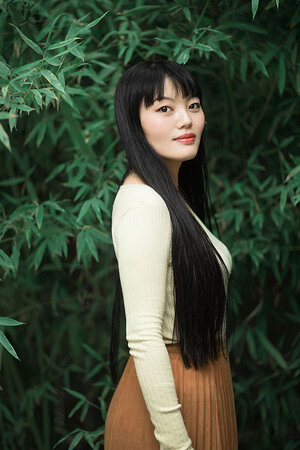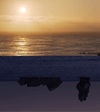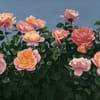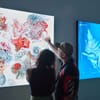The Beijing-born, Chicago-based artist Yuge Zhou creates video installations that examine people’s relationships and places in urban and natural environments. Yuge holds a master of Engineering from Syracuse University and another in Fine Art from the Art Institute of Chicago. She has exhibited in renowned galleries across the United States, Japan, Hongkong, Russia, and beyond. In our interview, Yuge shares her experiences as an immigrant and how they influenced her art.
You’ve been living in the United States for ten years now. How would you describe the process of adjusting to American culture? What impact did living in a foreign country have on your personal development and your work?
Yuge Zhou: I moved to the U.S. initially to go to Syracuse University and get a master’s degree in technology. I was also interested in experiencing a very different culture to counterweight my Chinese heritage. I made a conscious effort to make friends outside of my school community, and I also worked to master the language. The friction and discomfort from living in a foreign land inspired new ideas of expression. For example, I sought ways to explore such themes as individuality versus commonality in American society.
I am motivated to explore and transform myself into a hybrid of two cultures. While there are differences between the two societies, one of my themes is to portray universally shared emotions: relaxation, anxiety, joy, hope, indifference, loneliness—all of which is what I hope to evoke through the lens of my work.
Most of your previous work portrays individuals and communities in American public spaces while observing the relationships between humans and their environments. What were some aha-moments and findings while conducting these kinds of “social studies” of American urban life?
Yuge Zhou: As you can see in some of my work, I observe pseudo communities, groups of people that get together and drift away, especially in urban environments. One of the aha-moments for me was watching people playing volleyball and Frisbee on Oak Street Beach in Chicago during the summer. In my video Soft Plots, I show the joie de vivre from a distance. But the scene changes with a second look. Projectiles are thrown into the voids and reappear at the edge of the frame. Players disappear “under” an adjacent court only to pop up elsewhere. To me, this uncanny, fragmented perspective portrays a conception of urban living that is both group-oriented and discontinuous, with underlying conflicts and competitions. In many ways, we live in big cities as we live in small towns—except that our communities are scattered across a dense network of other storied lives of which we only catch a glimpse.
You describe that, although cities look more and more the same due to globalization, each city still has its very unique “humor.” For your video installation “Green Play” in Central Park, you drew inspiration from the theory of the four humors. Can you please expand on that? How would you describe the mood of Chicago compared to Beijing?
Yuge Zhou: Ancient Greek medicine laid out a theory of four “humors,” which suggests four essential body fluids and how they tip a person’s personality in one direction or another. The Greeks knew nobody was purely one humor: there were always overlaps and a desire for balance. I think places have their humors and leading characteristics too. The people who inhabit these cities live through them and shape these dispositions in a collective, symbiotic way. Each video in The Humors series portrays this subject itself in a slightly different way. Viewers may relate to the choreography of each video differently depending on the environments that they inhabit.
For example, Green play is a joyful orchestration of one of the most popular meeting places in New York City: Central Park, a romantic playground and repository shared by locals and tourists alike. The spliced footage choreographs a single Sunday in summer and encapsulates an optimism central to American life. Chicago has a variety of neighborhoods with diverse populations and more cars driven. Beijing is more homogenous and congested. Another significant difference is that Beijing is enclosed within itself. In Chicago, the lake gives an openness to the urban environment. These elements create far different dispositions between the two cities.
The pandemic has changed the dynamic of how people relate to urban spaces dramatically. Do you plan on tackling these disruptions and changes in urban life in future projects? What kind of approaches could be interesting to explore in that context?
Yuge Zhou: The current moment is a strange filter to look at in my previous work; the collaged spaces that individuals occupy mean something different from the current shelter-in-place order. When things move back to normality, the public scenes will also take on a very different social connotation and future protocol. I’ve explored the notion of borders and insiders and outsiders in various pieces, and I would like to do works more specifically about the current social changes.
My current video series Love Letters, responds to the collective emotional experiences of isolation and separation felt during the quarantine. The first episode of the series features two dancers standing on opposite banks of the Chicago River, creating a “dialogue” with each other and interacting from afar, using gestures against the industrial backdrop of Chicago’s South Side neighborhood. The second episode features the dancers moving towards each other at a narrow north branch of the river during the fall colors’ peak, and the third episode will be a duet in winter snowfall. The series transcends separation by creating a visual narrative that shows two individuals overcoming obstacles and barriers to find a connection. By basing this work in Chicago, I wanted to emphasize the potential of tapping into our shared emotions within our community.
In your recent video art installation, “when the East of the day meets the West of the night,” you address the relationship between you and your mother. What made you focus on this personal topic?
Yuge Zhou: Conversations inspired this project with my mother, who lives in Beijing, about the physical and emotional distances between us. I found myself longing for home and realizing that both countries are my home. That brought up this picture in my mind of two figures standing on the edge of the Pacific Ocean, contemplating and looking out towards each other at the same moment, feeling a connection despite the physical distance. However, what started as a personal piece has become something more relevant at this moment. While reading the news from both China and America about the pandemic, I observed fear, anxiety, and misunderstanding among both countries. So this personal statement has become a way to communicate shared commonality and compassion between China and the United States, which we need at this particular time.
“We humans all long for community, we all inhabit each other’s stories, we all experience peace and sadness and joy and fear in fundamentally similar ways. Culture reflects certain ways of being, but we all share core humanity and a longing for connection.” – Yuge Zhou
With your work, you also express a longing for rootedness. How do you define rootedness now, and how has its meaning for you changed/evolved within the last ten years?
Yuge Zhou: When I first arrived in the United States, I felt a sense of loss and sadness, unsure of the future. Last year, upon returning from a trip to China, more than ever, I felt confident with a sense of purpose. This surge of positive feelings has contributed to a sense of rootedness. Also, years of residing in Chicago made me observe the same scenes through the passing seasons, and this rhythm of time and place has given me a grounding effect.
You were planning to realize the second part of “when the East of the day meets the West of the night” with the moon’s rising in the Rocky Mountains and the Himalayan Plateau in China. With the renewal of the U.S. immigration freeze, you would be unable to return to the U.S., so the project is now on hold. How is the current situation, and when do you think you can travel to China?
Yuge Zhou: Unfortunately, the current situation hasn’t improved, and the project is still on indefinite hold. However, I’m hopeful that the new administration will lift the immigration freeze. In the meantime, I plan to turn my inability to see and film the moonset in China into an invitation to my family and friends to create temporary “placeholder” footage until I can travel again. I hope to see my mother, who has been in quarantine in Beijing since the start of the pandemic.
As someone who’s been in this country for over 12 years, I’ve seen the United States start to isolate itself over the past four years. Closing itself off to the rest of the world is pretty disheartening, especially the damage that has been done to the U.S. and China relationship over the pandemic. I’m just looking forward to hopefully having an administration that again welcomes the contributions of immigrants.

How do you perceive the United States’ dividedness as someone from abroad but forms part of American society?
Yuge Zhou: To me, one of the most intriguing aspects of American urban cities is cultural diversity and inclusiveness, people’s openness to that diversity, and its impact on their behaviors and lifestyles. As a foreigner and immigrant with a relatively more reserved cultural upbringing, this has inspired me to reinterpret the American scene from an outsider’s perspective. However, I’ve noticed an increasing amount of division in American society in recent years, catalyzed by rhetoric played out by certain politicians, the mainstream media, even digital technology like social media. It is hard to witness this setback, and I question what it means to belong in this country.
I believe that, inherently, the world is the same. We humans all long for community, we all inhabit each other’s stories, we all experience peace and sadness and joy and fear in fundamentally similar ways. Culture reflects certain ways of being, but we all share core humanity and a longing for connection.
On Twitter and at press conferences, Trump regularly spoke of the “Chinese virus.” His government insisted on the term “Wuhan virus” in a G7 declaration. In the USA and European countries, people of Asian origin reported increasing discrimination shortly afterward. Have you had similar experiences?
Yuge Zhou: I have heard of experiences of discrimination from my friends, even though I haven’t personally experienced that. As I mentioned in the previous answer, one of the reasons that motivated me to create when the East of the day meets the West of the night was a desire for a world in harmony. Ultimately, I have faith in human compassion and people’s understanding of the complexity of this pandemic.





